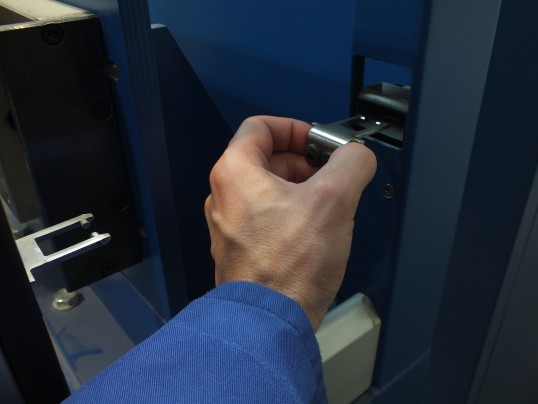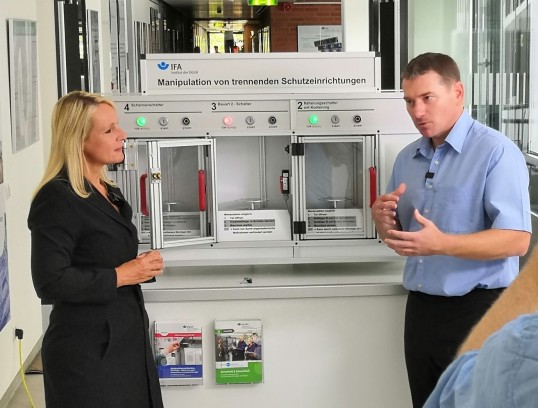- Elektromagnetic Fields
- Indoor workplaces
- Practical Solutions: Ergonomics
- Practical solutions: Hazardous substances
- Practical solutions: Noise
-
Practical solutions: Machine safety
- Defeating Protective Devices
- Electro-sensitive protective equipment
- Power drive systems with integrated safety functions
- Logic units to ensure safety functions
- Performance Level Calculator
- Testing of the electrical equipment of machines
- Risk assessment of workplaces with cobots
- Revolving doors
- Safety of machine controls to EN ISO 13849
- Software: SISTEMA
- Software: SOFTEMA
- Tin whiskers on printed circuit boards
- Practical solutions: Personal Protective Equipment
Prevent the defeating of safeguards
If hazards associated with machines cannot be eliminated or sufficiently minimised by design, then safeguards are used. Safeguards are designed to protect machine operators from the remaining hazards associated with the machine. However, safeguards are often repeatedly dismantled, bypassed or otherwise rendered inoperable, despite the risk associated with this. Occupational safety experts estimate that safeguards are temporarily or permanently tampered with on a quarter of all machines. This leads to thousands of work related accidents every year that are linked to the defeating of safeguards.
The most common reason for defeating safeguards is due to shortcomings in the machine’s safety concept. If the safety concept is not adapted to allow the machine to be operated with ease, then safeguards are seen as a nuisance. In such cases, the guard makes it difficult, if not impossible, to carry out maintenance work, set up, operate, troubleshoot or clean the machine. This constitutes a strong incentive for people working with such machinery to bypass the safeguard.
Companies that manufacture and operate machinery have a legal duty to ensure that all machinery placed on the market and made available to the public is safe. Machines with a high incentive for defeating are to be considered unsafe and must not be operated due to the increased risk of damage. So the question of whether or not a machine’s safeguards constitute an incentive to tamper with them and, if so, what measures can be taken to reduce this incentive, is therefore relevant to both the machine manufacturers and the companies operating the machines.
The following film is directed at machine manufacturers.
The following film is directed at people with management responsibility in machine-operating companies.
Take a Look!

New IFA App

Further information
- Checklist "Preventing the defeating of protective devices" (PDF, 4.9 MB, non-accessible)
- HVBG Report Manipulation von Schutzeinrichtungen an Maschinen (Defeating of protective devices on machinery; in German only)
- Summary of the HVBG Report (PDF, 23 kB, non-accessible) (in English)
New Internet portal:
www.stop-defeating.org
Advice to prevent defeating of protective devices for manufactureres, merchants and operators
Contact:
Accident Prevention: Digitalisation - Technologies
Tel: +49 30 13001-3525Fax: +49 30 13001-38001

